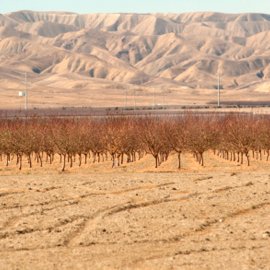Calfornia Dreamed
-
English
-
ListenPause
I’m Peter Neill, Director of the World Ocean Observatory. California dreamin’. We’ve all grown up with the promise of California, that place out West where the other coast meets up against the rest of the world, that has grown from a frontier opportunity and golden dream to a magical place that supplies our bodies with fruits and vegetables in fulsome variety and amount . But today California, like many other places on this earth, faces a fundamental challenge to its existence, its economy, its lifestyle, and its sense of place and self. What is different? It’s the water. Or the absence thereof. Here are five NY Times headlines from the past few weeks: “California Drought Is Worsened by Global Warming, Scientists Say.” “California Imposes First Mandatory Water Restrictions to Deal with Drought.” “In California, Spigots Start Draining Pockets.” “Mighty Rio Grande Now a Trickle Under Siege.” “For Drinking Water in Drought, California Looks Warily to the Sea.” The articles describe a sudden, painfully evident phenomenon that strikes at the heart of the financial, political, and social well being of the state, a social-geographical unit that exceeds the area and economies of many nations and makes an enormous contribution in production, taxes, and innovation to the rest of the United States and the world. California, truly, is too big to fail. And fail it might if it cannot come to terms with the demand for and supply of its most nurturing water. It was that water of course that built California and opened the west. Yes, there was western expansion, the lure of found gold, free land, benign weather, and infinite opportunity. The California dream, once begun, has never really ceased its powerful attraction. The psyche extends from Baja to Puget Sound, as Portland and Seattle expand on the concept, even as they object to those California license plates they see now headed north. Where do our children look for a future? Again and again, I hear the best and the brightest abandoning the declining urban infrastructure of the Atlantic cities for the lure of a future out west that still appears golden. That success was built on water – on the diversion of the great western rivers, large engineering projects, the dams and canals that brought water from the mountain ranges to turn the desert green, nurture the trees and plants and vines, and send that resultant bounty worldwide. California politics revolved around water rights and management. California markets epitomized the possibility of the increasing population and food demands of the US could be met, and then some through export of output and experience. As long as the water, like the center, was able to hold. What those headlines suggest is a conclusion long advanced here on World Ocean Radio: that the world water crisis is the single-most challenging aspect of the future, worldwide, to be dramatically exacerbated by climate circumstance derived from an extraction-based, unsustainable global consumer economy that does not conserve, continues to waste water without constraint, and withdraws and poisons an ever-increasing volume on earth both in the aquifer and the watershed the full length of the water cycle from ocean to atmosphere to mountain-top to riverine system to the ocean once again. We have spoken here of “peak water.” It is here now, unless we act urgently and accordingly. California is looking now to conservation, restriction, rationing, pricing, and desalination of the ocean. No water now will be exempt from a true value calculation and real cost, and the resultant distress will be palpable in California and other western states in the US, just as it has been in Sao Paolo, Brazil, in the Middle East, and in Africa where water has been the center of civilization for all time. This cannot and will not be a quiet, evolutionary fix. As we continue to argue here, the solution lies in an entirely new value proposition, built around the rightful use and distribution of water, that will change our behavior, realign our strategic investments, reallocate our assets, and change how we govern ourselves worldwide. There is promise here, perhaps a new California dream, but only if we listen, and accept responsibility for the future, and talk action. We will discuss these issues, and more, in future editions of World Ocean Radio.
Because of persistent drought and water crises due to unsustainable practices, California is facing many challenges to its very existence. It is water that built California and opened the West to expansion; and it is water now that poses the single-most challenging aspect of its future. In this episode of World Ocean Radio, host Peter Neill will share headlines of the last few weeks related to the water crisis, and will suggest that to find a solution we must look to an entirely new value proposition built around the rightful use and distribution of water.
About World Ocean Radio:
Peter Neill, Director of the World Ocean Observatory and host of World Ocean Radio, provides coverage of a broad spectrum of ocean issues from science and education to advocacy and exemplary projects. World Ocean Radio, a project of the World Ocean Observatory, is a weekly series of five-minute audio essays available for syndicated use at no cost by college and community radio stations worldwide. A selection of episodes is now available in Portuguese, Spanish, French, and Swahili. In 2015 we will add Mandarin to our roster of global languages, enabling us to reach 75% of the world's population. For more information, visit WorldOceanObservatory.org/world-ocean-radio-global.
Photo by Gregory Urquiaga, UC Davis
- Login to post comments



